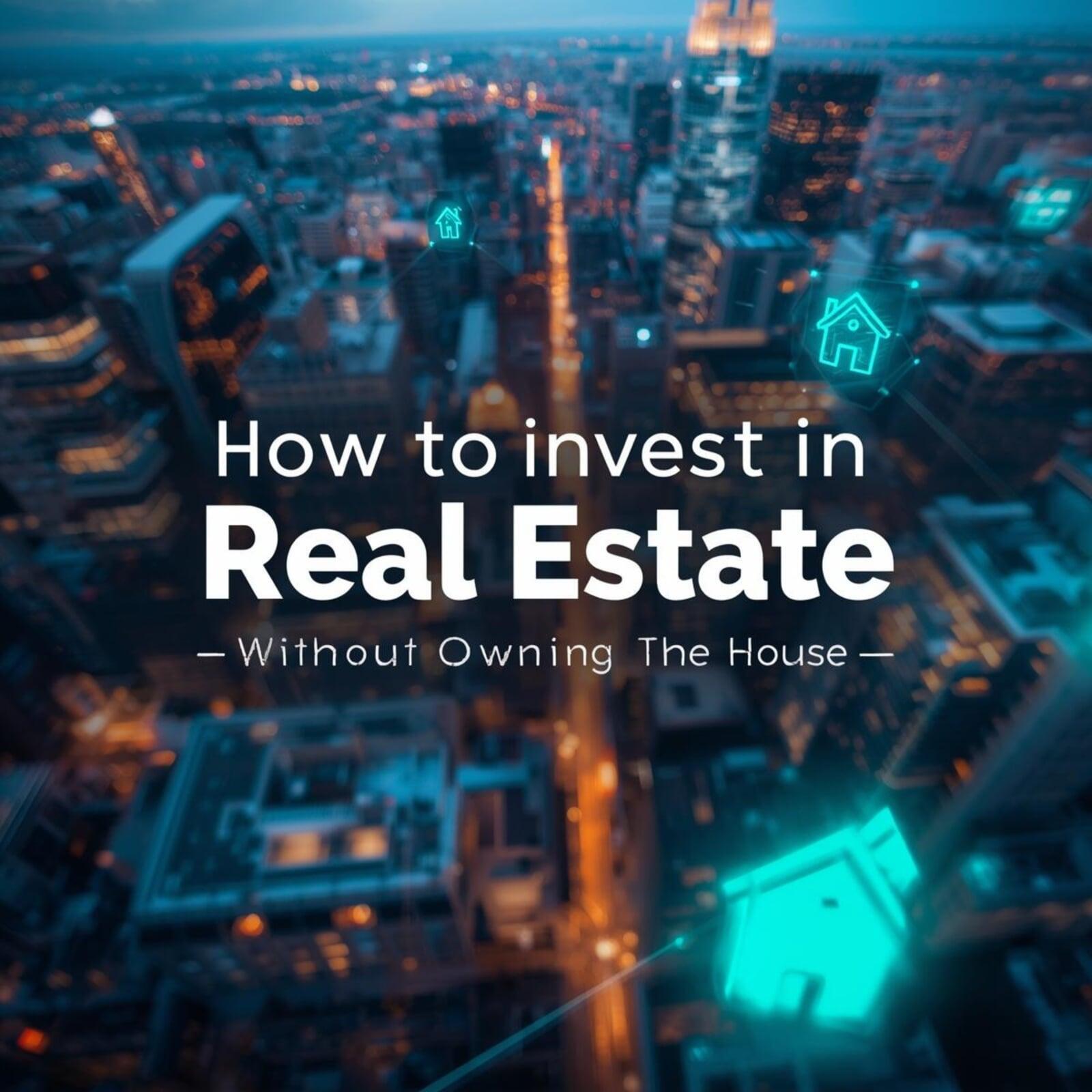When most people think of real estate, they have an expensive house, rich investor, or real estate agents roaming in luxury cars. All this seems to be a game of a rich man. But the truth is: You do not need a lot of wealth to start investing in real estate.
Yes, you read that right. You can get started with no money at all, or even as little as $100. And if you’re clever, you can even profit from real estate without ever owning a house.
In this blog, we’ll break down three questions people ask all the time:
Is it possible to start real estate with no money?
How to invest in real estate without owning the house?
Can you invest $100 in real estate?
By the end, you’ll see that real estate is not about starting big—it’s about starting smart.
Part 1: Is It Possible to Start Real Estate with No Money?
It seems impossible to step into real estate without any cash, right? But the truth is: Although it is not easy, it is absolutely possible. All you need is creativity, time and dedication.
1. Wholesaling
This is the most common "without money" strategy. It works like this:
You find an inspired seller (a person who has to sell quickly, often less than the market price).
You get property at a discounted price under the contract.
You hand over that contract to another buyer (usually a real estate investor).
You keep the difference with your fees.
👉 Example:
Seller agrees to sell for $180,000.
The investor is willing to pay $190,000.
You assign the contract and earn $10,000—without ever owning the house.
The only real costs are marketing (flyers, calls, or ads). That’s why wholesalers often start with almost nothing.
2. Bird-Dogging
Bird-dogging is like being a real estate scout. You don’t negotiate contracts. Instead, you find deals and pass them to investors for a finder’s fee.
It’s simple: you spot a distressed property → you pass it to an investor → you get paid a small percentage.
This requires zero money but lots of hustle. Think of it as training wheels for wholesaling.
3. Partnerships
Don’t have money but have time and energy? Team up with someone who has capital but doesn’t want the hassle.
You handle the grunt work—finding properties, managing tenants, overseeing repairs.
They provide the cash.
You split the profits.
It’s a win-win. You get experience without any financial risk.
4. Creative Financing
Apart from this, there are some techniques:
Seller financing: Instead of a bank loan, the seller becomes your lender. You pay them in installments.
Under the deal: You take the weight of a person's existing mortgage payment, but the loan remains in his name.
These require negotiation skills, but not big down payments.
The Trade-Off
Yes, it’s possible to start with no money. But instead of dollars, you’ll spend time, effort, and creativity. Expect late nights, lots of phone calls, and some rejections before you land your first deal.

Part 2: How to Invest in Real Estate Without Owning the House
Not everyone wants the headaches of owning property. Tenants calling at midnight? Toilets overflowing? Property taxes? No thanks. The good news is—you don’t need to own property to profit from real estate.
Here are smart ways to invest without becoming landlords:
1. REITs (Real Estate Investment Trusts)
Reits are companies that have income-producing properties like shopping malls, apartment complexes and offices. When you buy shares of reit, you are basically buying a part of those assets.
Benefits:
It is easy to buy (like stock).
Liquid—you can sell anytime.
Many pay dividends regularly.
Example: If you invest $500 in a reit focused on the apartment, you will receive a part of the rental income earned by the trust.
2. Real Estate Crowdfunding
Platforms like Fundrise, RealtyMogul, or CrowdStreet pool money from lots of small investors to fund large projects. You might own part of a shopping center or apartment building—even with a small contribution.
Benefits:
Lower entry costs (some start at $100).
Access to big projects you couldn’t buy alone.
Passive income.
Drawbacks: Your money might be locked up for years.
3. Private Lending
Instead of buying property, you become a bank. You lend money to investors or developers and earn interest.
Example: You lend $20,000 to a flipper for 12 months at 10% interest. At the end, you get $22,000.
This works best once you have some savings.
4. Syndications
Think of syndications as real estate partnerships on steroids. A group of investors pools money to buy large assets (like 200-unit apartments). A sponsor manages everything, and you invest passively.
You don’t own a house—you own a share in a company that owns real estate.
5. Note Investing
Here, you buy mortgage notes (debt). That means you step into the bank’s shoes and collect payments from the borrower. If they default, you can even take over the property.
It’s more advanced, but it’s another way to invest without ownership.
Part 3: Can You Invest $100 in Real Estate?
Most people assume real estate is only for the rich. But the rise of tech platforms has changed everything. Yes, you can start with as little as $100.
Options for $100 Investments
👉 Fractional Ownership
Platforms like Lofty AI and Arrived Homes let you buy a slice of a rental property. You might own 0.1% of a $300,000 house for just $100. You earn part of the rent and appreciation.
👉 REITs
Most brokerages allow you to buy REITs for less than $100. Some even offer fractional shares, so you can invest just $10–20.
👉 Crowdfunding Minimums
Some crowdfunding platforms have minimums of only $100, making them beginner-friendly.
👉 Micro-Investing Apps
Apps like Acorns let you round up spare change from daily purchases and automatically invest it into REITs. Imagine buying a coffee and investing $0.40 into real estate.
Why Starting Small Matters
Will $100 make you rich? No. But it builds the habit of investing. That first $100 teaches you how platforms work, helps you track returns, and motivates you to keep adding more.
The best investors didn’t start with millions—they started with something.
Real-Life Scenario: From $0 to Investor
Let’s imagine you’re starting today with no money. Here’s how your journey might look:
Year 1: You try wholesaling. After a few failed leads, you close your first deal and earn $5,000.
Year 2: You use that money to invest in crowdfunding projects ($500) and REITs ($1,000).
Year 3: Your network grows. You partner with an investor and manage a rental property, splitting profits.
Year 5: With savings and experience, you buy your first rental property outright.
From $0 to owning property—it’s possible if you start small and scale smart.
FAQs on Real Estate Investing with Little or No Money
1. Can I really start with no money at all?
Yes. Strategies like wholesaling, bird-dogging, and partnerships allow you to start without cash. You’ll trade effort for opportunity.
2. How safe is an investment of $ 100 in real estate apps?
More secure than gambling, but not risk-free. Reits and regulated platforms are generally safe, but always pay attention to fees and conditions.
3. What is the difference between REIT and crowdfunding?
Reits are publicly traded, liquid and varied. Crowdfunding is usually project-specific and less liquid, but can give more returns.
4. Can I lose money without money strategies?
Yes. If you do not understand the contracts or make an incorrect assessment of deals, you may face legal or financial problems. Education is the most important.
5. Do I need a license to wholesale properties?
Not always, but laws vary by state. Some areas require special licenses if you wholesale frequently.
6. Is real estate better for beginners?
It depends on your goals. Real estate can provide cash flows and benefits, while stocks are easy and more liquid to invest. Both investors do both.
7. What is the fastest way to become an owner of assets from $ 100?
Start with small investments (reits, partial shares), learn the market, and then move to active strategies such as wholesale sales or partnership.
8. How long does it take to make money with real estate?
It depends on the strategy. Wholesaling can generate money in weeks. Crowdfunding might take years. Rentals generate steady monthly income.
Final Thoughts
The old myth that real estate is only for the wealthy is dead. Today, technology and creative strategies make it possible for anyone to start.
👉 With no money, you can wholesale, bird-dog, or partner up.
👉 Without owning property, you can invest through REITs, crowdfunding, or notes.
👉 With just $100, you can buy fractional shares and begin your investing journey.
Remember: it’s not about how much you start with—it’s about how consistently you build. Every investor who owns blocks of property today once asked themselves the same question you’re asking now: “Can I really do this?”
The answer? Yes—you can.

